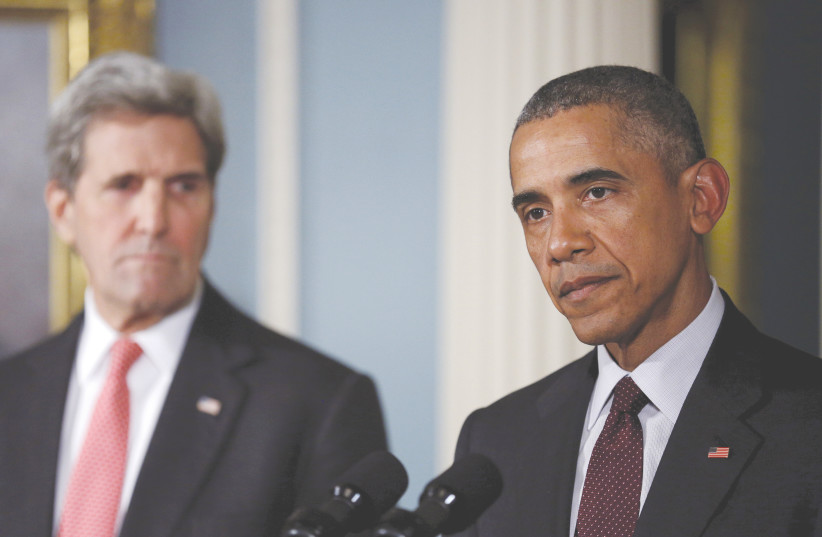 Does anyone really understand the two state solution? – opinion
Does anyone really understand the two state solution? – opinion
ALAN BAKER
While the two state solution could logically be the ultimate outcome of negotiations, it cannot and should not be blithely spouted out as a meaningless mantra or buzzword.
.

Not a day goes by without some leader, official or international organization calling for the two state solution as the ultimate and only logical outcome for settling the Israel-Palestinian dispute.
The two state solution seems to have been universally adopted by the international community and especially the present United States administration as the magic panacea for all the ills of the Israeli-Palestinian dispute and the broader problems of the Middle East.
In numerous public statements, the European Union periodically declares that it “remains committed to a just and comprehensive resolution of the Israeli-Palestinian conflict, based on the two state solution.”
Jordan’s King Abdullah repeatedly stresses the need to reach a just and comprehensive peace “on the basis of a two state solution, guaranteeing the establishment of an independent Palestinian state.”
On May 6, State Department Deputy Spokesperson Jalina Porter, while condemning the horrendous terrorist attack in the Israeli town of Elad, in which Palestinian terrorists hacked to death three Israeli citizens celebrating Israel’s Independence Day, found it necessary to refer to “the need to avoid unilateral steps that would exacerbate tensions and make it more difficult to preserve the viability of a two state solution.”

The Biden administration position parrots similar statements by Obama administration officials. In explaining the US abstention on the 2016 Security Council Resolution condemning Israel’s settlement activity (Resolution 2334), US representative Samantha Power referred to the two state solution 12 times.
Similarly, in his parting speech on December 28, 2016, Obama’s secretary of state John Kerry plied the two state solution no less than 24 times!
The automatic and convenient knee-jerk reaction to most Israeli responses to Palestinian terror and violence, or any action related to Jerusalem or to settlements, is inevitably the glib accusation that Israel is undermining the two state solution.
ONE MAY ask whether officials and international actors who automatically reiterate the term, fully understand it in light of the history and the realities of the Israeli-Palestinian dispute, or alternatively, is it just a convenient form of collective and generalized lip-service or wishful thinking?
The two state solution has never been accepted by Israel and the Palestinians as the agreed solution to their dispute, and it does not figure in any major peace process document, such as Security Council resolutions 242 (1967) and 338 (1973), or the 1993-5 Oslo Accords.
Even the 2003 Quartet proposal by the US, Russia, the EU and the UN entitled “Roadmap to a Permanent Two-State Solution to the Israeli-Palestinian Conflict” was never actually agreed by the parties, and was conditional on a negotiated resolution on the permanent status of the territories and normal relations between the Arab states and Israel.
While non-binding UN resolutions adopted since 2002 refer to a “vision of a region where two states, Israel and Palestine, live side-by-side within secure and recognized boundaries,” such vision has not been part of any formal, binding resolution or agreement between the parties.
The Oslo Accords, still the only valid and mutually agreed basis for resolving the dispute, determine that the permanent status of the territories remains an open negotiating issue. They contain no reference to a one, two or three state solution. On the contrary, in their September 9, 1993 exchange of letters, Rabin and Arafat declared that “all outstanding issues relating to permanent status will be resolved through negotiations.”
The two state solution mantra would thus appear, at best, to be wishful thinking, and at worst, an attempt to prejudge the outcome of the direct negotiating process.
As visualized by the Oslo Accords, core issues that are inherently bilateral, such as Jerusalem, refugees, settlements, water and mutual security, will only be resolved by negotiation and not by partisan political resolutions or political declarations, or utterances by international leaders, the UN, or any other source.
Similarly, agreement on a border can only be the result of negotiations and not the imposition of pre-1967 armistice delimitation lines that were distinctly not intended to serve as an international border.
Former Israeli prime ministers Rabin, Sharon and Netanyahu each visualized some form of Palestinian entity, possibly a demilitarized state, existing side by side in amity and mutual respect with Israel, with limited security and sovereign prerogatives.
Any such state would be expected to recognize Israel as the nation-state of the Jewish people, just as Israel would recognize a Palestinian state as the nation-state of the Palestinian people.
However, no such two state solution could materialize without cognizance of the necessary, basic components that a Palestinian state entity would need to meet, including political and economic stability, unified leadership, the ability to represent the entire Palestinian people, and the removal of terror elements and infrastructure.
Such an entity will need to commit to solid legal, political and security guarantees that it will not abuse its sovereign prerogatives and international standing in order to violate or undermine the agreements.
While the two state solution could logically be the ultimate outcome of negotiations, it cannot and should not be blithely spouted out as a meaningless mantra or buzzword.
It can only be achieved through bona fide negotiation between the parties to resolve the serious issues arising from the long and complex dispute between them.
The writer served as legal adviser to the Foreign Ministry and as ambassador to Canada. He participated in the negotiation of the Oslo Accords. He presently directs the international law program at the Jerusalem Center for Public Affairs.
Zawartość publikowanych artykułów i materiałów nie reprezentuje poglądów ani opinii Reunion’68,
ani też webmastera Blogu Reunion’68, chyba ze jest to wyraźnie zaznaczone.
Twoje uwagi, linki, własne artykuły lub wiadomości prześlij na adres:
webmaster@reunion68.com
